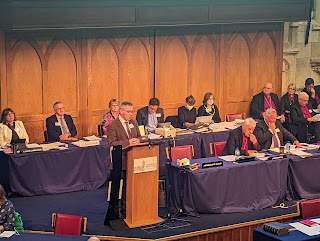Archbishop Clarke on the refugee crisis. What about the causes?
I was delighted to see that Archbishop Clarke gave a lecture on 25 May 2016 on the theme of refugees. His lecture was entitled ‘The Stranger at the Gate’ and focused on our response to the refugee crisis and displaced people across the world.
The Archbishop addressed the size of the crisis and how we need to respond, but he did not mention anything about the underlying causes.
Some useful statistics from the UN were mentioned in the speech,
The United Nations Refugee Agency estimates that, worldwide, there are almost 60 million forcibly displaced people; over 45 million men, women and children are being helped or protected by the UN High Commission for Refugees, and over half of all refugees are under 18 years old. And, as we survey the European aspects of the refugee crisis, we need first to accept that nearly 90% of all known refugees are being cared for, not here in Europe, but in the developing world, those countries that can least afford any influx of impoverished newcomers.The Archbishop spoke about the need for dignity, justice and humanitarian support towards the ‘strangers at the gate’ and emphasised that they have not left their homelands for any motives other than desperation.
I wholeheartedly support what he has said.
Any speech about refugees also needs to address the underlying causes of the crises that displace people from their homes. We see the horrors of the civil wars in Syria and Iraq frequently on the news, so a simple answer could be conflict causes displacement. This is true but it also leads to a further question, what caused the conflicts? Turning again to the UNHCR can help answer these questions.
In 2015 the UNHRC chief António Guterres highlighted the root causes of displacement:
"Urbanization, demographic growth, climate change, food insecurity, water scarcity - all these things acting together force displacement and create competition for resources which can generate conflict and that can then generate other forms of displacement."Indeed in 2009 António Guterres predicted that climate change would become the biggest driver of displacement.
As well as caring for refugees, the church needs to highlight the need for development in vulnerable countries by promoting education, sustainable agriculture, and adaption to climate. The Bishops’ Appeal does a good job of supporting development agencies in this work.
The church can also take a lead in calling for an ambitious response to the greatest threat: climate change. I long for the day when the Archbishop calls on business leaders and governments in Ireland for a more rapid transition to a low-carbon economy. The Church of Ireland needs to take a lead, act decisively and divest the church’s investments from fossil fuels.
.JPG)


Comments